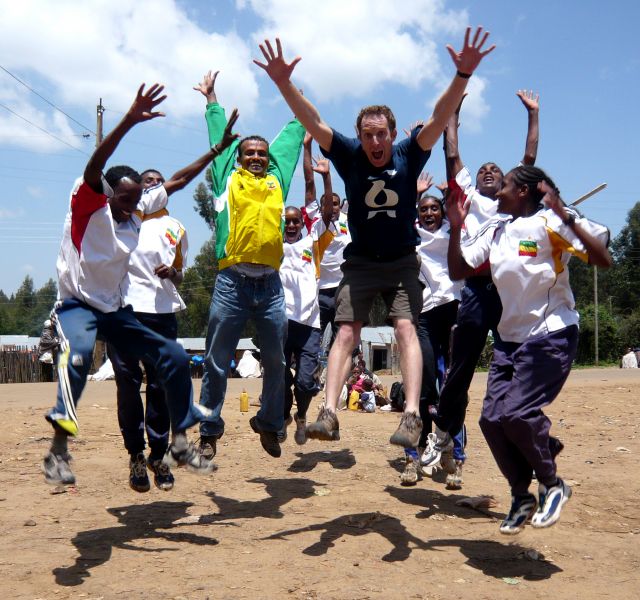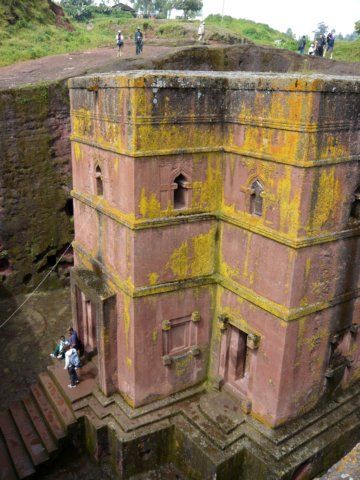I was born in Africa and so its always special going back. It generally takes a while to get used to how things work, if they work, and then you get in the rhythm and really start learning so much about yourself and the world around you.
This episode starts with a frantic flight and only shows the tip of the logistical iceberg when discovering that the flights we booked three months ago didn't exist on the airline system. We were catching a connection through Dubai and other passengers were pushing and shoving their way forward, mostly Nigerians bringing back huge bundles of merchandise to sell back home. Pretty full on, but the plane always takes off, and somehow we always seem to be on it.
 Something that truly separates this show from other travel shows is that we film and discover mostly on the fly - sometimes we have no idea what our stories will be or if they'll work for both travel and TV editors. There is little time, and no research team travelling ahead of us. It adds a lot of pressure. The People Chain was pure luck - meeting a guy like Joseph and being able to participate in his wonderful work to help impoverished athletes was so unexpected and amazing for all of us. I got his number from an old friend in Vancouver who I just happened to bump into on Commercial Drive...a chance encounter and the next thing you're shooting a TV show about it - that's Word Travels. Joseph offered me a million bucks if I could beat his runners, and whether he was serious or not, I was serious about getting some fat extra zeroes in my skinny bank account. I lasted about 3 minutes before I wanted to collapse from exhaustion. We were running hard, and we were running at altitude. But I kept moving because I knew it would be a great part of the show. The scene at the end, when the guys pick me up and carry me up the hill, was spontaneous (and much appreciated, I wouldn't have made it back to the car without them). What a great jump shot too. And by the way, my T-shirt has a symbol on it, it's the number one in Aramaic. As if. Something that truly separates this show from other travel shows is that we film and discover mostly on the fly - sometimes we have no idea what our stories will be or if they'll work for both travel and TV editors. There is little time, and no research team travelling ahead of us. It adds a lot of pressure. The People Chain was pure luck - meeting a guy like Joseph and being able to participate in his wonderful work to help impoverished athletes was so unexpected and amazing for all of us. I got his number from an old friend in Vancouver who I just happened to bump into on Commercial Drive...a chance encounter and the next thing you're shooting a TV show about it - that's Word Travels. Joseph offered me a million bucks if I could beat his runners, and whether he was serious or not, I was serious about getting some fat extra zeroes in my skinny bank account. I lasted about 3 minutes before I wanted to collapse from exhaustion. We were running hard, and we were running at altitude. But I kept moving because I knew it would be a great part of the show. The scene at the end, when the guys pick me up and carry me up the hill, was spontaneous (and much appreciated, I wouldn't have made it back to the car without them). What a great jump shot too. And by the way, my T-shirt has a symbol on it, it's the number one in Aramaic. As if. Special shout out to Mule our guide. He's a young guy from Addis who's charming and on the ball and really took great care of us. Mule knows that westerners can be a little shell-shocked when encountering the mayhem of Addis and elsewhere for the first time, and really helped steer us towards the magic and away from the nastiness. If you're interested in contacting him, you can email him here: mtamirat@yahoo.com,
 Like the rest of Ethiopia, Lalibela was vivid. Those churches are so dark and old and removed from the restored gloss factor of many other historical wonders. It sees a fair bit of tourism and they make you pay for it, with the surrounding village basically feeding itself off the tourists who pass through. The issue of giving to beggars was something that again, materialized on the fly and we knew we'd have to be careful on how to portray it. We were warned about various tourist scams and I was frequently disappointed that encounters with locals would inevitably lead to them. I go into more detail in the report on my website. But the churches, and the stunning countryside, not to mention drinking late nights in tiny shacks with pounding Ethiopian rock music were unforgettable. Like the rest of Ethiopia, Lalibela was vivid. Those churches are so dark and old and removed from the restored gloss factor of many other historical wonders. It sees a fair bit of tourism and they make you pay for it, with the surrounding village basically feeding itself off the tourists who pass through. The issue of giving to beggars was something that again, materialized on the fly and we knew we'd have to be careful on how to portray it. We were warned about various tourist scams and I was frequently disappointed that encounters with locals would inevitably lead to them. I go into more detail in the report on my website. But the churches, and the stunning countryside, not to mention drinking late nights in tiny shacks with pounding Ethiopian rock music were unforgettable.
In a high speed world that's increasingly wireless, I really struggled with the dial-up connections, when we could find one working. It was expensive and slow, and a real sign just how much I've come to rely on being online, both as a living and as a socially networked person. We all struggled a bit, but if we wanted things to be like they are at home, then why bother leaving in the first place?
Oh, and I love Ethiopian food. One of my best cuisines...nothing like some spicy "tibs" stew dumped in a large plate of soggy injera...

< back to the episode
< back to the list of articles |

